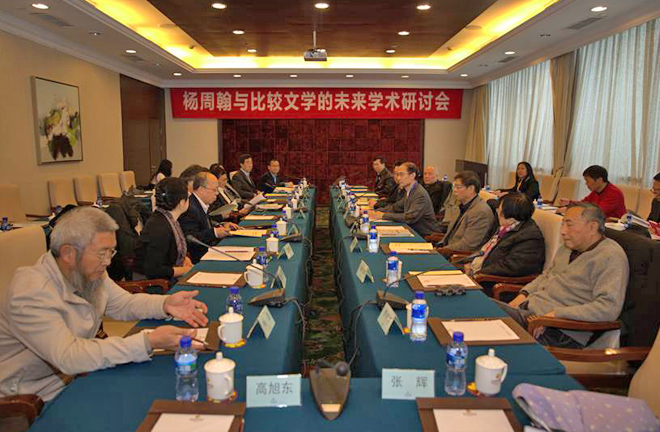China’s comparative literature goes global

Yang Zhouhan (1915-89), the founder of contemporary Chinese comparative literature
The “Symposium on Yang Zhouhan and Future of Comparative Literature” was held on Nov. 7 in Beijing. This event aimed to commemorate the 100th anniversary of Yang Zhouhan’s birth. Yang (1915-89), the founder of contemporary Chinese comparative literature, put forward the notion that China’s comparative literature should break through the thinking model of Eurocentrism and focus on studies of oriental literature.
Yang’s idea is coming true after 30 years of efforts from academics in Chinese comparative literature. “In the era of economic globalization, Chinese culture and literature are going global in tandem with the rapid development of China’s economy. It is time for the international comparative literature circle, which is dominated by Western scholars, to listen to Chinese scholars. The ‘Chinese school’ of comparative literature is coming into being,” said Wang Ning, a professor from the Department of Foreign Languages and Literatures at Tsinghua University.
Rooted in national soil
Yang said China’s scholars shouldn’t sink into the mire of “Eurocentrism” but depend on China’s national soil while conducting research on comparative literature. That is the key reason why Chinese comparative literature has attracted wide attention from foreign scholars.
Chinese comparative literature has manifested characteristics different from the West since its birth. Yue Daiyun, a professor from the Department of Chinese Language and Literature at Peking University, quoted Yang as saying Western comparative literature formed in colleges, while China’s was related to political and social reformation. Chinese comparative literature aimed to revitalize the nation and develop national literature from the beginning based on Chinese society and a long tradition of Chinese literature.
Original contributions
Since some scholars attempted to establish the “Chinese school” in the 1980s, there have been non-stop heated discussions centered on this topic in comparative literature circles. Academics in Chinese comparative literature have a common interest in making original contributions to the development of world comparative literature.
Cao Shunqing, president of China Comparative Literature Association, said cross-cultural and cross-civilization studies put forward by scholars of Chinese comparative literature are important innovations, different from the theory of Western comparative literature. Traditional comparative literature was based on seeking common ground, while cross-civilization studies focus on differences in literature among different civilizations. Seeking differences aims to ultimately achieve complementation.
Rise of the ‘Chinese school’
Early in 1827, Johann Goethe (1749-1832) proposed the concept of “world literature.” However, world literature was just a utopian ideal for hundreds of years under the domination of Eurocentrism. Nowadays, Goethe’s prediction has come true with enormous changes taking place in the world situation. World literature is emerging and rapidly entering the forefront of international literature theory and comparative literature research.
The rise of world literature has provided a new broad platform for the study of Chinese comparative literature. Yue is analyzing how Chinese comparative literature will play an important role in international academia. Yue asserted that alphabetic writing and pictographic writing respectively represent the bases of Western and Chinese culture. Theories of Western literature are not completely suitable for Chinese culture. Breaking away from the theoretical system of Western hermeneutics, rhetoric and poetry, Chinese comparative literature may forge a new world in literature, Yue said.
Wang claimed that “English Centrism” in the circle of international comparative literature will still last a long time and it is unrealistic to wait for others to translate Chinese literature and culture into English. In fact, some scholars are entering international academia by writing works in English or opening up features to discuss China’s issues in Western mainstream academic journals. “People will gradually find that the ‘Chinese school’ is rising and becoming strong,” Wang said.

 PRINT
PRINT CLOSE
CLOSE